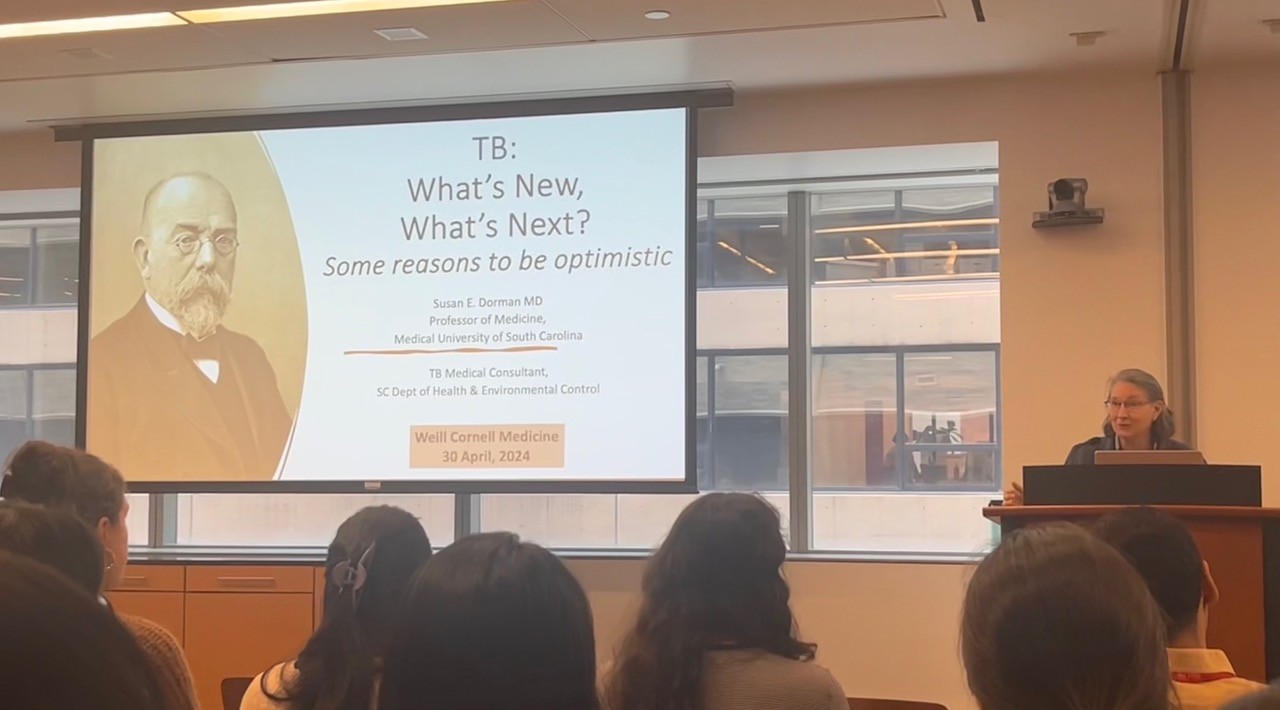'The TB Treatment Landscape: 2024' – by Dr. Susan Dorman

On April 30, The NYC-TRAC hosted Dr. Susan Dorman, Professor of Medicine at the Medical University of South Carolina in Charleston, who has co-authored national guidelines for management of TB and leads a research team that focuses on development of new TB diagnostics and treatments. Dr. Dorman gave a talk entitled "The TB Treatment Landscape: 2024," which provided a comprehensive update on TB research and its promising future.
Dr. Dorman began the seminar with an insightful overview of TB epidemiology, shedding light on the disease's global impact and the significant challenges it continues to pose. She also shared her personal journey into TB research, looking back on one of her initial encounter with a TB patient and many compelling aspects of TB that sparked her enduring passion for this field.
The core of her presentation focused on four optimistic innovations shaping the future of TB treatment and research:
- Advancements in Genome Sequencing of M. tuberculosis: Dr. Dorman discussed how sequencing of the M. tuberculosis (Mtb) genome is supporting our understanding of TB’s genetic complexity. This progress is crucial for developing more effective diagnostics and drugs.
- Movement Away from a "One Size Fits All" Treatment: She highlighted the shift from a “one-size-fits-all” TB treatment regimen towards strategies which provide multiple options and take into account various factors such as severity, susceptibility, pharmacokinetics, clinical history, etc.
- Recognition of the TB Spectrum: Acknowledging the varied phases from TB infection to disease has been investigated, she featured the recent shift of focus from dichotomous of “Active” or ”Latent” TB framework to a more nuanced approach which includes subclinical TB in both research and clinical practice.
- Understanding TB Transmission: She emphasized the current paradigm of TB transmission by people with multibacillary pulmonary TB by showing some recent evidence that asymptomatic smear negative patients may be exhaling M tuberculosis.
Dr. Dorman also addressed several challenges that remain in the field, including the need for new simplified molecular diagnostics for drug resistance testing to second line and new TB drugs, . One of our TRAC’s young researchers, Dr. Andrea Doltrario is working in this area, focusing on developing novel urine-based biomarkers for diagnosing pulmonary tuberculosis in people co-infected with HIV. Dr. Dorman also pointed out the lack of measurements of patient’s response to TB treatment and cited the recent publications from Dr. Kayvan Zainabadi on transcriptional biomarkers of differentially detectable Mtb in patient sputum (paper 1, paper 2).
Concluding her seminar, Dr. Dorman shared a heartfelt message, encouraging trainees to find and pursue their passions within their research.
(link to paper 1: https://doi-org.ezproxy.med.cornell.edu/10.1128/aac.00608-21)
(link to paper 2: https://doi-org.ezproxy.med.cornell.edu/10.1128/mbio.02701-22)
Read more about the NYC TRAC here: https://nyctrac.weill.cornell.edu/about-us
Article by Nao Haba
Weill Cornell Medicine Center for Global Health
Center for Global Health
420 East 70th Street, 4th Floor, Suite LH-455
New York, NY 10021
Phone: (646) 962-8140
Fax: (646) 962-0285

